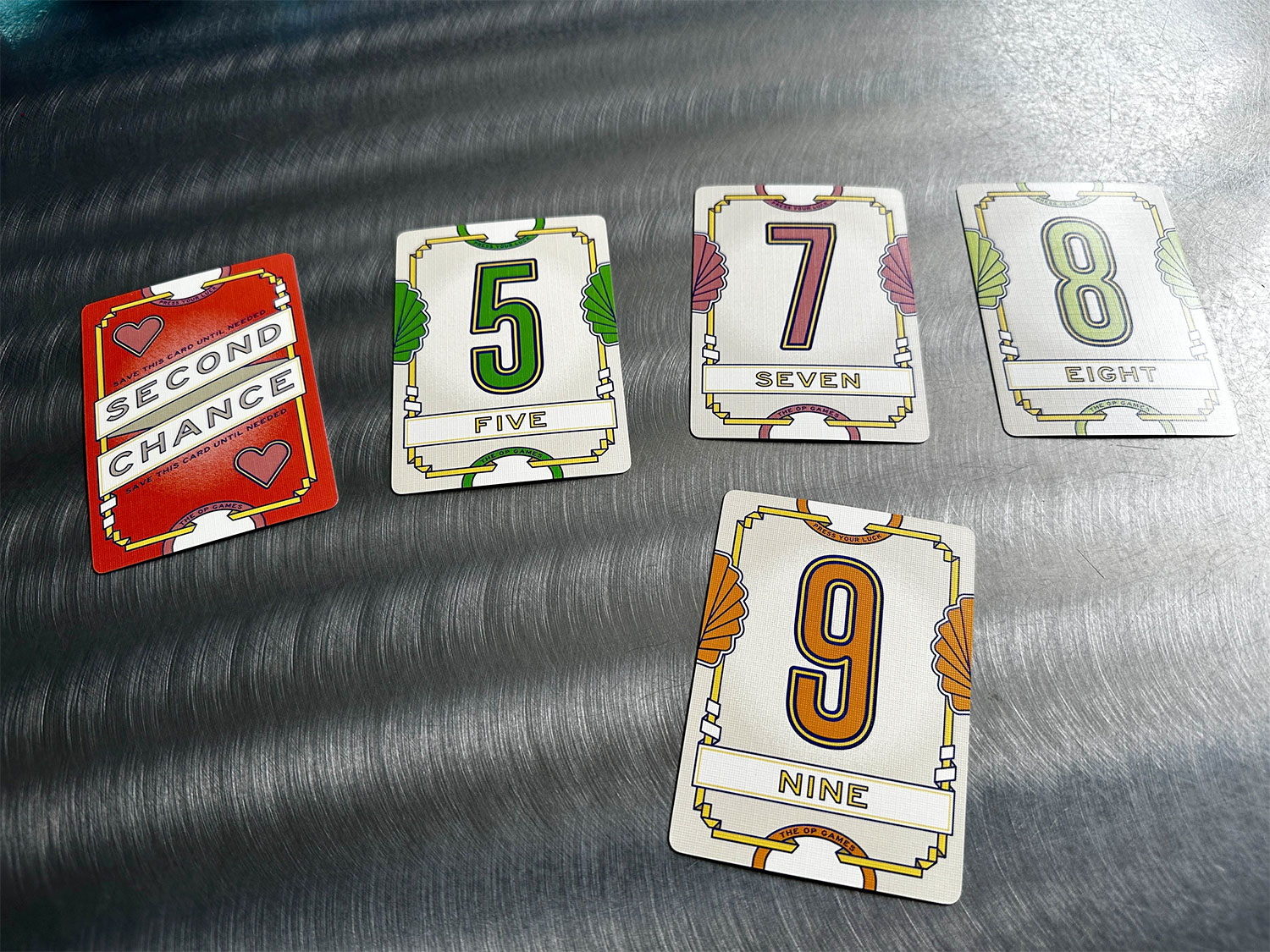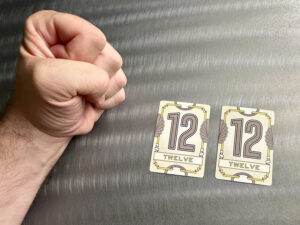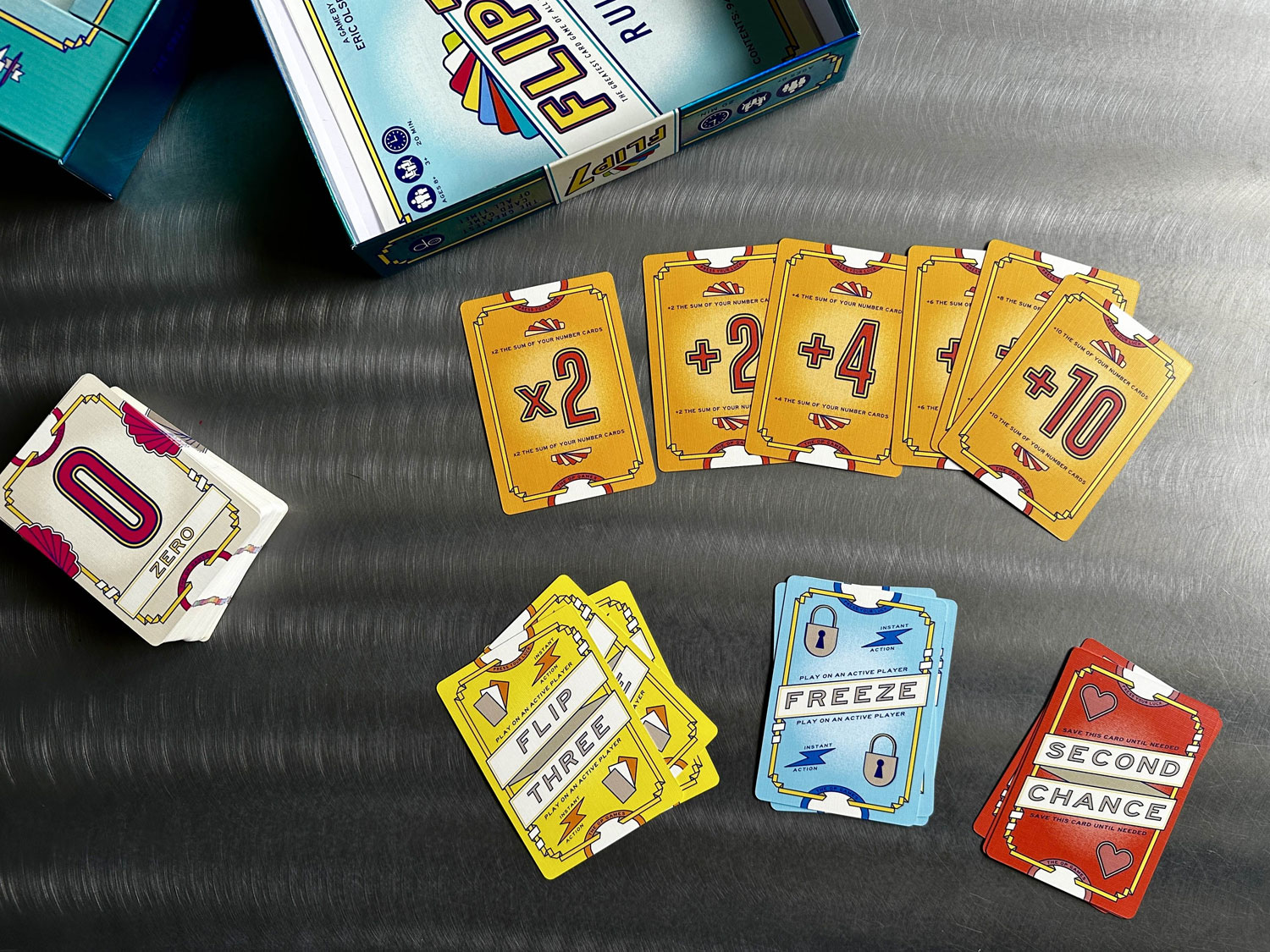 “Hey, you wanna play XYZ game?”
“Hey, you wanna play XYZ game?”
“I don’t know. How long does it play?”
“3 hours. Plus a teach…”
Kill me.
Don’t get me wrong: meatier games can be enjoyed or even preferred. But for those of us who would rather enjoy the company of our friends or have similar internal monologues, then Flip 7 from the OP might be the answer you’re looking for. Unless you don’t like fun.
Gameplay Overview:
Flip 7 is a press-your-luck race to 200 points. Pick a player to be the dealer for your first round. On your turn, choose to hit (have a card dealt to you) or stay (bank your points for the round). The game is played with a deck of numbered cards (0-12), modifiers that double or add up to 10 points to your total, and special cards. These special cards let you stop another player’s round, force someone including yourself to flip three cards in a row, or get a second chance. This second chance card is helpful because if you hit a number already dealt to you during the round, you’re out and receive no points.
With the numbered cards, each integer has a matching number of cards in the deck (the 12 card has twelve cards, 11, and so on; 0 and 1 both have one card). If you manage to hit seven number cards in a round, you end the round for everyone and gain 15 bonus points. Otherwise, the round ends once the last player chooses to stay. Points are totaled by adding up number cards and any modifiers. Each round, the next person in order becomes the dealer and play continues this way until someone reaches or exceeds 200 points.

Game Experience:
Flip 7 is great when you want something casual and doesn’t burn many brain calories to teach or play. It’s entertaining for those who enjoy pushing their luck. I love these kinds of games, so I took a shine to it immediately. While many games of this style focus on you pushing your luck without other player interaction, I liked how the special cards brought a strategic and interactive element. Forcing someone into an early bust or icing them out of earning more points was always satisfying. As lucky as you might feel flipping a second chance card, more often than not, it felt like a target should anyone else draw a flip 3 card, especially if you hampered that player’s chances at points earlier in the game.

For everything that Flip 7 presents, it does it well. This is a light game and it doesn’t try to be more than that. More frequently, I find myself gravitating to games like this. I have less time and desire to play something longer and more complex; I know I’m not the only one who’s felt this internal shift over the last few years.
Ok, with all these positives, what are the negatives? There aren’t any, or at least none that should keep you from playing/buying this. The box size was overkill for just a deck of cards and an oversized rulebook, but I’m sure you can figure out your own portable solution for this. Some people might have a negative experience if they’re the constant target of special cards that cut their rounds short. It’s true, you’re at the mercy of what you draw, but I’d tell you if you hated your experience because of this targeting, maybe that says more about the people you played with than the game itself. These “negatives” are just FYIs; they don’t change my overall opinion of the game.

Final Thoughts:
Casual games will always have a broader appeal and thus an audience willing to try out “your new game”. For all the games you bought with the intention of playing with others, Flip 7 has no barriers you’ll have to overcome in convincing them to play it with you at least once. With holidays and get-togethers around the corner, you really can’t go wrong with bringing this one.
Final Score: 4 Stars – A push-your-luck with a side of player interaction equal fun times
 Hits:
Hits:
• Low rules barrier to teach and play with anyone
• Special cards introduce player interaction into an otherwise push-your-luck solo experience
Misses:
• Oversized box for a deck of cards.
• You might have an negative take on the game if you’re the target too often or have bad draws






















I had a friend say they needed to buy this immediately to save themselves from having to deal with family over the holidays.